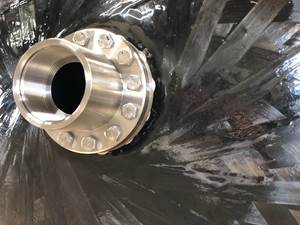SGL Carbon technologies aimed at automotive, aerospace applications
SGL Carbon is demonstrating its production capabilities for the automotive, aerospace and industrial sectors.
Editor’s note: ÂÌñÏ×ÆÞ received several new product and technology announcements ahead of JEC World 2020, which had been scheduled for March 3-5. Although that exhibition was postponed to May, CW is now publishing the announcements we received. This is one of them.
SGL Carbon (Wiesbaden, Germany) is demonstrating its production capabilities for the automotive, aerospace and industrial sectors. The company offers customized solutions with individual component designs combined with tailored materials and production processes ready for large scale production.
In the field of automotive applications, SGL Carbon is presenting its composite battery enclosures as a promising new application driven by increasing demand for electric vehicles and the resulting new flexible chassis
platforms. The company is demonstrating a prototype of a battery enclosure based on carbon fibers, though it says hybrid carbon/glass fiber composites are also possible.
In early January 2020, SGL Carbon reported that it received a large order from a North American automotive manufacturer for the serial production of top and bottom layers for battery enclosures, with production to begin at the end of 2020.
In addition, SGL Carbon is showcasing for the first time a new leaf spring
generation made of glass fiber composites that is used as a longitudinal leaf
spring for the rear axle of the Ford Transit. In comparison to conventional leaf springs, this composite leaf spring is said to weigh up to 50% less while
offering increased security standards and supporting a one-to-one compatibility with standard springs. The Ford leaf spring complements SGL Carbon’s large-scale production of transversal leaf springs for a variety of Volvo models and the Mercedes Sprinter. In total, SGL Carbon has delivered more than 1.5 million leaf springs.
In the area of aerospace primary structure components, the company is presenting a demo exhibit for the door frame of a passenger airplane realized in collaboration with external partners and based on 50K carbon fiber from the SGL Carbon, which the company says is suitable for serial production. To further speed up its growth in the sector, the company entered into a development cooperation with Solvay at the end of last year to bring fiber materials for primary structural components based on large-tow carbon fibers to the market for the first time.
For aerospace applications such as small aircraft, helicopters and air taxis, SGL Carbon offers a full range of services, from engineering to finished components. On display at JEC World is a carbon fiber-based concept for an innovative rotor arm for urban air mobility applications made with what the company says is an innovative manufacturing technology. At the beginning of the year, the company started serial production of landing gears made of braided carbon fiber material, which it says will be used around the world in air taxis of an international manufacturer over the course of the next two years.
As an example for industrial applications, SGL Carbon is showcasing a crossbeam made of carbon fiber-reinforced plastics (CFRP) used in automated Schuler press lines. Besides weight savings of up to 40% compared with conventional materials, the composite crossbeam is also said to feature high rigidity and strength, as well as a low thermal expansion and good damping performance, which in turn minimizes machine vibrations. The use of CFRP is said to boost production efficiency of the system and increase its lifetime, due to lower wear and tear expectancy.
The company is also giving live simulations at its booth. Experts from the company’s Lightweight and Application Center are available to demonstrate the path from concept to virtual prototypes using simulation software. Visitors can register ahead of time: https://www.sglcarbon.com/anmeldung-jec.
Related Content
Plant tour: Airbus, Illescas, Spain
Airbus’ Illescas facility, featuring highly automated composites processes for the A350 lower wing cover and one-piece Section 19 fuselage barrels, works toward production ramp-ups and next-generation aircraft.
Read MoreInfinite Composites: Type V tanks for space, hydrogen, automotive and more
After a decade of proving its linerless, weight-saving composite tanks with NASA and more than 30 aerospace companies, this CryoSphere pioneer is scaling for growth in commercial space and sustainable transportation on Earth.
Read MoreOtto Aviation launches Phantom 3500 business jet with all-composite airframe from Leonardo
Promising 60% less fuel burn and 90% less emissions using SAF, the super-laminar flow design with windowless fuselage will be built using RTM in Florida facility with certification slated for 2030.
Read MoreLow-cost, efficient CFRP anisogrid lattice structures
CIRA uses patented parallel winding, dry fiber, silicone tooling and resin infusion to cut labor for lightweight, heavily loaded space applications.
Read MoreRead Next
Next-gen fan blades: Hybrid twin RTM, printed sensors, laser shock disassembly
MORPHO project demonstrates blade with 20% faster RTM cure cycle, uses AI-based monitoring for improved maintenance/life cycle management and proves laser shock disassembly for recycling.
Read MoreCeramic matrix composites: Faster, cheaper, higher temperature
New players proliferate, increasing CMC materials and manufacturing capacity, novel processes and automation to meet demand for higher part volumes and performance.
Read MoreScaling up, optimizing the flax fiber composite camper
Greenlander’s Sherpa RV cab, which is largely constructed from flax fiber/bio-epoxy sandwich panels, nears commercial production readiness and next-generation scale-up.
Read More.jpg;width=70;height=70;mode=crop)












